

As mentioned in last week's Journal The English Apple Man visited Dr Robert Saville at NIAB at East Malling on Wednesday 6th March for an update on the progress of Growing Kent & Medway. My last visit was on 23 October 2023
 Kent and Medway is home to some of the most exciting and innovative food and drink businesses in the UK and internationally. From growers of fresh fruit and vegetables, to food processes and makers, through to engineers and robotics specialists automating our supply chain.
Kent and Medway is home to some of the most exciting and innovative food and drink businesses in the UK and internationally. From growers of fresh fruit and vegetables, to food processes and makers, through to engineers and robotics specialists automating our supply chain.
I spent an hour over a coffee in the Orchard Restaurant at EMR, listening to Robert passionately explaining the opportunities for introducing more sustainable production via Growing Kent & Medway Business Sustainability Challenge
Robert said this Sustainability Challenge is really about 'inspiring & creating' a business model achieving it's 'own circular economy' with the potential to bring new products from waste generated by the primary product 'closing the loop' with a fully sustainable 'no waste' product
During our conversation we discussed many opportunities for changing 'past or current' practices
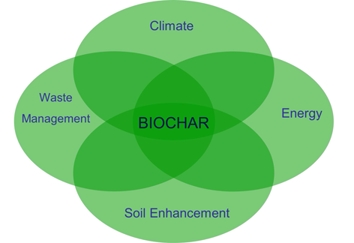 In fruit growing terms, historically we would clear the winter pruning's and burn them. Today the annual winter prune does not produce as much pruning's and they can be swept into the alleyway and collected and burnt or generally pulverised and allowed to break down into the soil.
In fruit growing terms, historically we would clear the winter pruning's and burn them. Today the annual winter prune does not produce as much pruning's and they can be swept into the alleyway and collected and burnt or generally pulverised and allowed to break down into the soil.
We speculated that the grubbing process when the orchard life ends, probably ends up on a big bonfire, but it could be used to make BIOCHAR
The thermal process used to produce biochar is known as pyrolysis, and by altering the pyrolysis conditions, it's possible to change the character of the biochar. In general higher pyrolysis temperatures mean a smaller amount of char, but containing a greater proportion of highly stable carbon.
Robert remembered a quote by an agronomist friend, in terms of social acceptability, "burning pruning's in an orchard is now tantamount to a past practice of smoking in an aeroplane cabin"
Below: left. Grubbing an apple orchard and right. Burning the trees on a bonfire
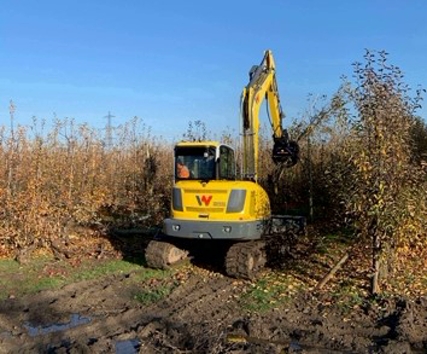
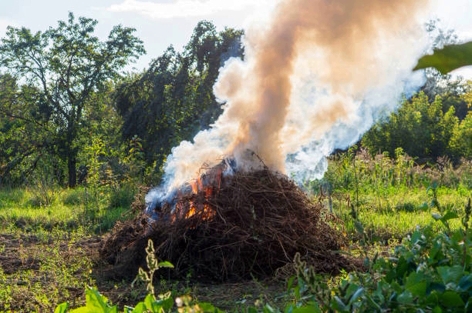
Moving onto the next tranche...........
Business Sustainability Challenge
Robert emphasised this is a challenge!
Are you ready to take on the Growing Kent & Medway Business Sustainability Challenge?
"We are looking to fund innovative ideas, processes, or technologies to support sustainable production, products and packaging in the horticulture, food and drink supply chain.
Local innovation with a big impact: funding to support sustainability in horticultural and plant-based businesses
Grants worth between £10,000 and £50,000 for short-term, high-impact, innovative projects are available.
The second round of our Business Sustainability Challenge is now open.
The video below reviews the first phase of innovative challenges and stimulates the mind to identifying possible new developments.
Click on: Growing Kent & Medway Video
Proposals demonstrating collaboration between businesses are encouraged.
Who can apply?
Your business must operate in the horticultural and plant-based food and drink industries, or propose a project which will positively impact these sectors.
You can apply individually but we encourage collaborative applications between businesses.
The lead applicant must be a Kent or Medway-based micro, small or medium sized business. At least 75% of project activity needs to take place in the Kent and Medway region. You must also demonstrate impact on the Kent and Medway economy.
A grant of 50% of the eligible project costs will be reimbursed at the end of the project. You (and if applicable your partners) will need to co-invest a minimum of 50% of the total project cost through match funding.
If you're unsure whether you are eligible to apply, speak to our team.
How to apply
You will need to start your application by creating an online account. We will then send you the full application form, which will need to be submitted by midnight 30th April 2024.
Please note we will only accept one application per business. This is a competitive process.
Our team can support you throughout the application process. Email contact@growingkentandmedway.com for help.
Example
From the first phase
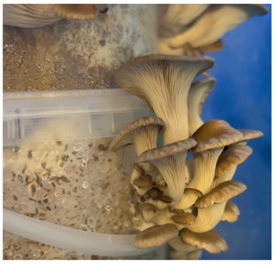 Canterbury Brewers & Distillers Ltd received over £13,000 to develop a new system that uses their waste grains, energy, water, and carbon dioxide from their brewing process, to produce speciality mushrooms.
Canterbury Brewers & Distillers Ltd received over £13,000 to develop a new system that uses their waste grains, energy, water, and carbon dioxide from their brewing process, to produce speciality mushrooms.
Director, Jon Mills said, "After building a heat recovery system that heats our restaurant and bar from waste heat during the distillation process, I realised we could potentially use all our waste from our production of whiskey, beer and gin making. The Growing Kent & Medway Business Sustainability grant has allowed us to prove that we can be growing more than 100 kg of speciality mushrooms from our brewing waste.
We are excited to see what further success our very own circular economy can have with the potential to bring new mushroom spirits to market!"
Example 2 from first phase
Growing Kent & Medway Research Supports Energy Savings in Apple Stores
The financial difficulties facing British apple growers have been well documented in The Fruit Grower in recent times. Only last month, British Apples and Pears Ltd reported on a new set of data highlighting the plight of our apple growers who have faced a 30% increase in production costs whilst receiving only 8% increase in returns from their supermarket customers over the past two years. One of the major contributors to increased costs has been the energy used by growers in refrigerated storage of their fruit.
In 2023, Growing Kent & Medway launched its 'Business Sustainability Challenge.' The grant fund encouraged the industry to collaborate with other businesses to test innovative ideas, processes or technologies to support sustainable production, products and packaging, and the food and drink supply chain.
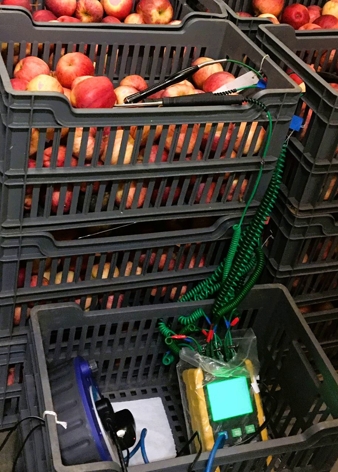 A.C. Hulme & Sons led a successful bid collaborating with Richard Colgan at The University of Greenwich, along with Avalon Fresh, GridDuck, Stemy Energy UK and British Apples and Pears Ltd, to seek ways of reducing energy consumption during long-term apple storage.
A.C. Hulme & Sons led a successful bid collaborating with Richard Colgan at The University of Greenwich, along with Avalon Fresh, GridDuck, Stemy Energy UK and British Apples and Pears Ltd, to seek ways of reducing energy consumption during long-term apple storage.
The project which runs from September 2023 to April 2024 is trying to better understand how much energy is being consumed across the constituent parts of a long-term apple store. These include energy used in the running of the store fans, the defrosting of the refrigeration plant, the use of CO2 scrubbers and also of nitrogen generators.
In effect, they are undertaking an energy audit during the storage life of apples whilst being held in refrigerated conditions. Stores of Gala apples at A.C. Hulme & Sons, two Avalon Fresh growers and the Produce Quality Centre, are being monitored continually for their energy use throughout the storage life of the fruit.
This has been made possible through the involvement of GridDuck who have special remote sensors that are clamped to the constituent parts of the store and measure the electrical pulse transmitted through each part on an hourly basis.
The information can be relayed back to GridDuck who operate a dashboard which allows the energy use of each part of the store to be displayed by the hour, day or week.
This allows researchers to understand when peaks of demand are occurring.
British Apples and Pears Ltd (BAPL) plan to carry out a survey of apple growers to better understand the capacity of existing storage in the industry and find out what growers are currently doing to reduce energy consumption. It is hoped to use the results to guide BAPL's future research strategy.
Aligned to this work is an investigation being led by experts at Stemy Energy UK, who use advanced artificial intelligence to make real time adjustments to cold store operations to increase their energy efficiency. In this project, they are relating energy use to changes in store temperature and fruit temperature. They want to understand the impact of switching the refrigeration off for short periods (1-2 hours) on the temperature of the fruit in the store, and the resulting impact on fruit quality. If the impact on final fruit quality is negligible, then there may be potential for growers to reduce their energy consumption whilst still providing high quality fruit to their customers.
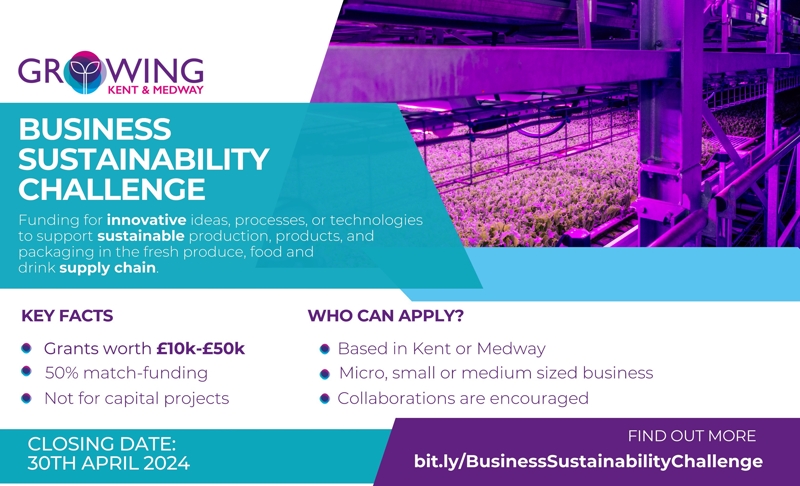
Finally, the link below of an on line meeting held to demonstrate the opportunities for the new challenge
![]() That is all for this week, next week The English Apple Man will feature BAPL's 'Manifesto'
That is all for this week, next week The English Apple Man will feature BAPL's 'Manifesto'
The ten actions in the BAPL manifesto concern a range of issues from fair contracts with supermarkets to labour, environmental protection and innovation.
Take care
The English Apple Man